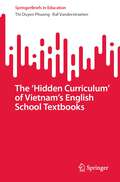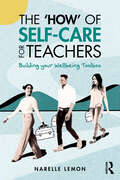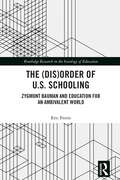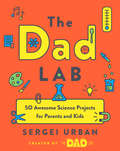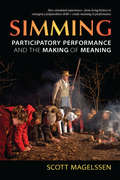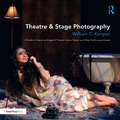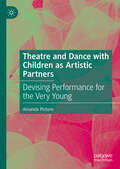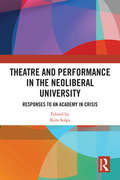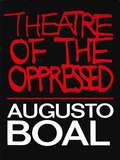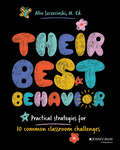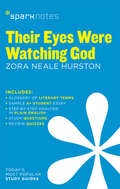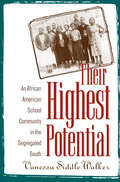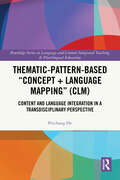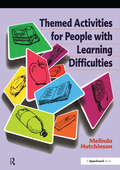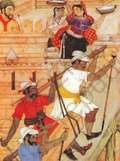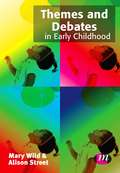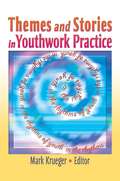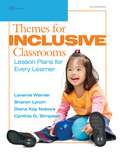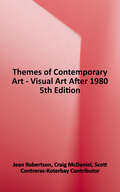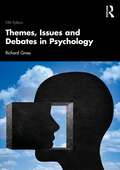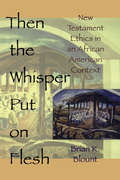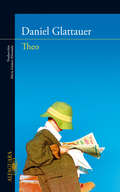- Table View
- List View
The ‘Hidden Curriculum’ of Vietnam’s English School Textbooks (SpringerBriefs in Education)
by Raf Vanderstraeten Thi Duyen PhuongThis book analyzes the basic ideas and premises underlying the English textbooks used at the higher secondary school level in Vietnam from the 1980s to the present, from a sociological perspective. The dataset, upon which this book builds, consists of a collection of 18 textbooks, which belong to five sets of locally developed English textbooks for grade 10 to grade 12 students. These series were used in all public schools from the mid-1980s to the present. During this period, schooling expanded rapidly in Vietnam, while English also gained increasing prominence within the school system.This book examines the curricular content of these textbooks and presents a long-term analysis of the ‘hidden’ curricular content in light of Vietnam’s recent history and its government’s concerns about national identity.
The ‘How’ of Self-Care for Teachers: Building your Wellbeing Toolbox
by Narelle LemonProviding insights, ideas, strategies and compassion, this book offers a new way of looking at self-care for educators experiencing exhaustion and stress, or who may simply be feeling more tired than they should be.Drawing on personal experiences of burnout, as well as research in wellbeing literacy, self-care and positive psychology, Narelle Lemon presents a new framework for self-care. Designed especially for teachers of any discipline or sector, the framework is based on five key dimensions: self-compassion, mindful awareness, habits, time, and empowerment. Evidence-based and easy to follow, these dimensions scaffold the tools and strategies offered in the book, allowing the reader to create their own toolbox based on what resonates with them most. The book is designed to be flexible, so the reader is encouraged to follow the recommendations as closely as they wish, or to take inspiration for their own ideas, acknowledging that tools will change over time and across contexts. The practical tools in this book are further supported by reflective prompts, as well as opportunities for extension with tips for leaders, working groups and the education sector more broadly.Written by a teacher for teachers, this book gives you not only the tools but also the permission to look after yourself. It will show you that self-care is an act of self-love, self-compassion, and self-awareness, and that it is relational and you need to care for you in order to care for others.
The: Zygmunt Bauman and Education for an Ambivalent World (Routledge Research in the Sociology of Education)
by Eric FerrisThis book critically interrogates the function of schooling in the United States of America using the writings of sociologist Zygmunt Bauman. Asking whether the function is to produce citizens, workers, a combination of the two, or something altogether different, it argues that the designs of schooling are part of a carefully crafted ordering, illustrated via an analysis of the ways in which schooling introduces students to various forms of coercion and seduction that socialize students in particular ways: ways that support an order. By engaging with the prolific and insightful works of one of the most prominent social thinkers of the 21st century, this book considers schooling and its contributions to order. Be they solid or liquid modern ordering mechanisms, ordering through repression and seduction, or supporting ordering through the creation of boundaries separating an “orderly inside” from its “disorderly outside,” schools imperfectly support the construction of order and in doing so, privilege some representations and individuals over others. To order is to harness ambivalence and steer it in directions that privilege the “in” group at the expense of the “out” group; and schools, from the curriculum they teach to the values and ideas they promote, are desirable captive marketplaces instrumental in steering this ambivalence. The author ultimately suggests that the function of schools, whether recognized or not, are not so much to educate students to be free thinkers, but rather to be orderly cogs in a particular functional social machine. As such, the book will be of interest to faculty, scholars, and postgraduate-level students with interests in the sociology of education, schooling, sociology, and social theory.
TheDadLab: 50 Awesome Science Projects for Parents and Kids
by Sergei UrbanThe ultimate collection of DIY activities to do with your kids to teach STEM basics and beyond, from a wildly popular online dad.With more than 3 million fans, TheDadLab has become an online sensation, with weekly videos of fun and easy science experiments that parents can do with their kids. These simple projects use materials found around the house, making it easier than ever for busy moms and dads to not only spend more quality time with their children but also get them interested in science and technology.In this mind-blowing book, Sergei Urban takes the challenge off-screen with fifty step-by-step projects, including some that he has never shared online before. Each activity will go beyond the videos, featuring detailed explanations to simplify scientific concepts for parents and help answer the hows and whys of their curious children. Learn how to: * explore new fun ways to paint; * make slime with only two ingredients; * defy gravity with a ping-pong ball; * produce your own electricity, and more!With TheDadLab, parents everywhere will have an easy solution to the dreaded "I'm bored" complaint right at their fingertips!
Theater: Participatory Performance And The Making Of Meaning
by Scott MagelssenAt an ecopark in Mexico, tourists pretend to be illegal migrants, braving inhospitable terrain and the U. S. Border Patrol as they attempt to cross the border. At a living history museum in Indiana, daytime visitors return after dark to play fugitive slaves on the Underground Railroad. In the Mojave Desert, the U. S. Army simulates entire provinces of Iraq and Afghanistan, complete with bustling villages, insurgents, and Arabic-speaking townspeople, to train soldiers for deployment to the Middle East. At a nursing home, trainees put on fogged glasses and earplugs, thick bands around their finger joints, and sandbag harnesses to simulate the effects of aging and to gain empathy for their patients. These immersive environments in which spectator-participants engage in simulations of various kinds—or “simming”—are the subject of Scott Magelssen’s book. His book lays out the ways in which simming can provide efficacy and promote social change through affective, embodied testimony. Using methodology from theater history and performance studies (particularly as these fields intersect with cultural studies, communication, history, popular culture, and American studies), Magelssen explores the ways these representational practices produce, reify, or contest cultural and societal perceptions of identity.
Theatre & Stage Photography: A Guide to Capturing Images of Theatre, Dance, Opera, and Other Performance Events
by William KenyonDocumenting theatrical and stage events under the often dramatic lighting designed for the production provides a number of specific photographic challenges, and is unlike most every other branch of photography. Theatre & Stage Photography provides an overview of basic photography as it applies to "available-light" situations, and will move both basic and experienced photographers through the process of accurately capturing both the production process and the resultant performance. The book is accompanied by additional web content found at stagephoto.org, including tutorials, author blog, a photo gallery, and more resources.
Theatre and Dance with Children as Artistic Partners: Devising Performance for the Very Young
by Amanda PintoreThis book offers a methodological framework for developing research-based Theatre and Dance for the Very Young (TDVY) performances in which artists collaborate with children ages 0-6 and their caregivers and/or educators as creative partners in the process. It provides a detailed investigation of all stages of the work including: designing and executing a creative research plan, analyzing tools for assessment, using research results as the foundation of a devising process, and outcomes for final performances for this age range. This process reflects on years of creative research with very young children, the results of which include methods for building collaborative performances with a variety of institutions such as early childhood centers, universities, community spaces, and non-profit arts organizations. The main themes addressed in this book are innovative methods for devising and collaboration, the translation of research into performance, and the integral bonds between early childhood development and artistic experiences.
Theatre and Performance in the Neoliberal University: Responses to an Academy in Crisis (Routledge Research in Arts Education)
by Kim SolgaExploring how educators and institutions might embrace the STEAM turn to ensure that theatre and performance can be instrumental to the neoliberal university, without being instrumentalized by it, this volume showcases alternative models for teaching and learning in theatre and performance in a neoliberal age. Originally a special issue of Research in Drama Education, this volume foregrounds the above ideas in six principal articles, and provides a range of potential models for change in twelve case study discussions. Detailing a variety of ‘best practices’ in theatre and performance education, contributors demonstrate how postsecondary educators around the world have recentred drama and performance by collaborating with STEM-side faculty, using theatre principles to frame and support interdisciplinary learning, and working toward important applications beyond the classroom. Arguing that the neoliberal university needs theatre and performance more than ever, this valuable collection emphasizes the critical contribution which these subjects continue to make to the development of students, staff, and institutions. This book will be of particular interest to students, researchers, and librarians in the fields of Theatre Studies, Performance Studies, Applied Theatre, Drama in Education, and Holistic Education.
Theatre of Urban
by Kathleen GallagherBecause of its powerful socializing effects, the school has always been a site of cultural, political, and academic conflict. In an age where terms such as 'hard-to-teach,' and 'at-risk' beset our pedagogical discourses, where students have grown up in systems plagued by anti-immigrant, anti-welfare, 'zero-tolerance' rhetoric, how we frame and understand the dynamics of classrooms has serious ethical implications and powerful consequences.Using theatre and drama education as a special window into school life in four urban secondary schools in Toronto and New York City, The Theatre of Urban examines the ways in which these schools reflect the cultural and political shifts in big city North American schooling policies, politics, and practices of the early twenty-first century.The Theatre of Urban not only explores the very notion of performance in a novel and interesting way, it also provides new insights into the conflicts that often erupt in these highly charged school spaces.
Theatre of the Oppressed
by Augusto Boal Charles A. McbrideThe innovative Brazilian playwright, director and international lecturer explicates Aristotle's poetics and the philosophies of Machiavelli, Hegel and Brecht to determine the extent to which their chief components--imitation, catharsis and, ultimately, audience control--serve up to support the status quo of a society rather than facilitate change.
Their Best Behavior: Practical Strategies for 10 Common Classroom Challenges
by Allie SzczecinskiFind peace in the classroom with practical strategies for managing student behavior challenges In Their Best Behavior: Practical Strategies for 10 Common Classroom Challenges, seasoned educator Allie Szczecinski presents a lifeline for teachers overwhelmed by disruptive classroom behavior. The book addresses common problems and offers concrete, actionable strategies based on special education principles to manage student behavior effectively. With examples drawn from real-life classroom scenarios, Szczecinski illustrates how to diffuse disruptions and foster an environment conducive to learning. This invaluable guide transcends typical behavior management tactics by focusing on child-affirming and teacher-centric approaches. From tackling common issues like backtalk and aggression to handling work refusal and disengagement, Their Best Behavior equips you with the tools you need to restore calm and order to your classrooms. Inside the book: Gain insights into managing the ten most common elementary classroom behavior challenges Learn techniques backed by special education principles for a wide range of elementary settings Discover strategies that go beyond punitive measures to create a supportive and effective classroom environment Their Best Behavior is an essential read for elementary school teachers seeking support and strategies to manage challenging classroom behavior. Special education teachers, school leaders, and educators in need of practical solutions will find this book an instrumental resource in their professional development journey, helping them to foster a positive and productive learning atmosphere.
Their Eyes Were Watching God SparkNotes Literature Guide (SparkNotes Literature Guide Series #60)
by SparkNotesTheir Eyes Were Watching God SparkNotes Literature Guide by Zora Neale Hurston Making the reading experience fun! When a paper is due, and dreaded exams loom, here's the lit-crit help students need to succeed! SparkNotes Literature Guides make studying smarter, better, and faster. They provide chapter-by-chapter analysis; explanations of key themes, motifs, and symbols; a review quiz; and essay topics. Lively and accessible, SparkNotes is perfect for late-night studying and paper writing. Includes:An A+ Essay—an actual literary essay written about the Spark-ed book—to show students how a paper should be written.16 pages devoted to writing a literary essay including: a glossary of literary termsStep-by-step tutoring on how to write a literary essayA feature on how not to plagiarize
Their Eyes on the Stars: Four Black Writers
by Margaret Goff ClarkTraces the lives of four black writers who wrote of the Negro experience in eighteenth-and nineteenth-century America: Jupiter Hammon, George Moses Horton, William Wells Brown, and Charles Waddell Chesnutt.
Their Highest Potential
by Vanessa Siddle WalkerAfrican American schools in the segregated South faced enormous obstacles in educating their students. But some of these schools succeeded in providing nurturing educational environments in spite of the injustices of segregation. Vanessa Siddle Walker tells the story of one such school in rural North Carolina, the Caswell County Training School, which operated from 1934 to 1969. She focuses especially on the importance of dedicated teachers and the principal, who believed their jobs extended well beyond the classroom, and on the community's parents, who worked hard to support the school. According to Walker, the relationship between school and community was mutually dependent. Parents sacrificed financially to meet the school's needs, and teachers and administrators put in extra time for professional development, specialized student assistance, and home visits. The result was a school that placed the needs of African American students at the center of its mission, which was in turn shared by the community. Walker concludes that the experience of CCTS captures a segment of the history of African Americans in segregated schools that has been overlooked and that provides important context for the ongoing debate about how best to educate African American children. African American History/Education/North Carolina
Thematic-Pattern-Based “Concept + Language Mapping”: Content and Language Integration in a Transdisciplinary Perspective (Routledge Series in Language and Content Integrated Teaching & Plurilingual Education)
by Peichang HeThis book explores the issue of “integration” in content and language integrated learning (CLIL), and addresses the need for effective content and language integration by proposing the thematic-pattern-based “Concept+Language Mapping” (CLM) approach.Peichang He explores effective integration of content and language learning during the instruction of content subjects using students’ additional language as the medium of instruction. The volume introduces the contextual background of a large-scale school-university collaboration CLIL research project and builds the conceptual framework of a thematic-pattern-based CLM pedagogy by drawing on the language-based theory of learning (Halliday, 1993), the construct of thematic patterns (Lemke, 1990), and the recent development of genre-based pedagogy (Lin, 2016; Rose & Martin, 2012). The research probes the design of thematic-pattern-based CLM teaching resources and examines the impact of the CLM pedagogy on students’ development of language and content knowledge during their learning of different junior and senior English Medium Instructed subjects. The author enhances the conceptual framework based on the ongoing research findings and the burgeoning literature on translanguaging practice (García & Li, 2014; Lemke & Lin, 2022; Lin, 2019) and proposes a trans-disciplinary plurilingual thematic-pattern-based CLM approach. The book concludes with a discussion on some promising future research orientations including a transdisciplinary plurilingual thematic-pattern-based CLM approach for CLIL sustainability, catering for learner diversity in CLIL, and teacher professional development in thematic-pattern-based CLM practice. The book shows readers the design of CLM materials and activities which are demonstrated through classroom interactions in lessons of different subjects and grades for students of diverse cognitive abilities and linguistic backgrounds.This insightful volume will be of interest to researchers and trainee teachers exploring pedagogical approaches to CLIL, plurilingual, and transdisciplinary education and will provide pedagogical implications for teachers of both language and content subjects in schools worldwide.
Themed Activities for People with Learning Difficulties
by Melinda HutchinsonUser-friendly and practical, this is an excellent resource for all professionals looking to run creative sessions with people with profound and complex learning difficulties. Using a selection of twenty everyday objects, it provides resource materials, ideas and flexible structures to extend and complement professionals' existing approaches. It examines a range of teaching approaches, ideas for adapting activities and equipment, and how to present materials and tasks to the student while providing ideas, work outlines, activities and methods, recording sheets and photocopiable materials. It can be used with individuals and groups in a variety of settings, including educational establishments, day provisions or at home and is designed to provide opportunities for participation at all ability levels. With the help of this book, the list of object-based activities is endless!
Themes In Indian History Part 2 class 12 - NCERT
by National Council of Educational Research and TrainingAn apt choice of textbook for students of Class 12, this textbook "Themes in Indian History Part - 2" will give the students an insight of Indian history. It has been published by NCERT and strictly follows the guidelines and syllabus defined by the Central Board of Secondary Education (CBSE). This book has been designed to enrich the knowledge of the students about the Mughal Empire, Agrarian Society and other past events. The significant events have been explained in a chronological order to have a better understanding of historical occurrences and their causes.
Themes and Debates in Early Childhood (Early Childhood Studies Series)
by Dr Mary Wild Alison StreetEarly Childhood is a complex and diverse field. This text is designed to help students understand and engage with current themes in early childhood, supporting the development of critical thinking skills. Key themes such as children's voice, child wellbeing, identities and professional relationships are presented and opened up for the reader through essential theory and selected extracts. Thought provoking activities in all chapters help students to get a deeper understanding of contemporary themes in early childhood, supporting them in assignment writing and in linking theory to practice. About the Early Years Series This series has been designed to support students of degrees and foundation degrees in Early Years, Early Childhood and related disciplines. Each text takes a focused look at a specific topic and approaches it in an accessible and user-friendly way. Learning features help readers engage with the text and understand the subject from a number of different viewpoints. Activities pose questions to prompt thought and discussion and further reading suggestions, including useful websties, are included to help students access extended learning in each topic. Other titles in the series are Early Childhood Studies, Child Development for Early Childhood Studies, Child Observation for the Early Years and Exploring Play for Early Childhood Studies.
Themes and Stories in Youthwork Practice
by Mark KruegerLearn to follow the rhythms of building a relationship with youth at riskThemes and Stories in Youth Work Practice takes a refreshing look at the creative possibilities of working with youth in a variety of group care and developmental settings. Author Mark Krueger presents an innovative approach to developing relationships through shared experiences that plays out like modern dance, choreographed according to individual needs and strengths but always open to improvisations that follow the rhythms of life. The book also promotes a framework of understanding youth work through personal stories constructed alone and together by youth and youth workers.Themes and Stories in Youth Work Practice offers a unique perspective on theory and practice as it examines human interaction as an interpersonal, inter-subjective, and contextual process. The book recounts a day in the life of a youth worker, examines qualitative inquiries conducted by youth workers, recalls personal stories, and addresses the ways youth workers' experiences influence their interactions with youth. Counselors working in community centers, group homes, treatment centers, and community and group care programs will discover how to use the interactive dance between workers and youth at risk to create human compositions, advancing the story and getting a feel of where they are in moments of connection, discovery, and empowerment.From the author:"Youth work is like a modern dance. We bring ourselves to the moment and try to interact in synch with youths' rhythms for trusting and growing. As we interact, we are in a sense, in-and passing through-youth. The challenge is to know ourselves so that we can know each other, and this comes about in part through a constant exploration of our stories. It also comes about when we are in youth work with youth, learning how to dance."Geared toward experienced youth workers but equally relevant for students and anyone new to the field, Themes and Stories in Youth Work Practice is an enlightening read for anyone working in, or for, residential treatment centers, group homes, shelters, foster care, juvenile justice programs, community-based youth serving organizations, after school programs, recreation programs, camps, churches, and neighborhood centers.
Themes for Inclusive Classrooms: Lesson Plans for Every Learner
by Laverne Warner Cynthia Simpson Diana Nabors Sharon LynchThis is the perfect book for teachers who have typically developing young children ages 3-6, as well as children with special needs in their classrooms. Each lesson plan features objectives, a materials list, a circle or group time activity, assessment strategies, accommodations/modifications, and curriculum connections. The curriculum connections expand the children's learning into many areas, such as social studies, art, literacy, science, and music. The modifications and accommodations make the lesson plans accessible for all children, including those with: Autism Spectrum Disorder Speech or language impairments Hearing impairments Visual Impairments ADHD Cognitive and/or developmental delays Emotional disturbances Orthopedic impairments By using the lesson plans in Themes for Inclusive Classrooms, teachers can meet the needs and interests of all the children in their classrooms with a balance of child-initiated and teacher-directed activities.
Themes of Contemporary Art: Visual Art After 1980, 5th Edition
by Jean Robertson Craig McDanielThis book offers students and readers an introduction to recent art. The primary focus is an examination of themes that are widespread in contemporary artistic practice. Individual chapters analyze thematic content in eight groupings: Identity, The Body, Time, Memory, Place, Language, Science, and Spirituality. These eight thematic categories provide a significant sample from which readers can grasp influential concepts that stretch across much of the art of our time. Profiles of key artists and works enhance students' understanding of these major themes and the individual approaches and key movements in the world of contemporary art.
Themes, Issues and Debates in Psychology
by Richard GrossThemes, Issues and Debates in Psychology presents an integrated view of Psychology by identifying underlying themes (such as the scientific nature of Psychology, cultural and gender differences), issues (ethical, methodological and conceptual), and debates (such as heredity vs. environment, free will vs. determinism, normality vs. abnormality) which permeate the discipline as a whole. The text adopts a critical approach to ‘mainstream Psychology’, attempting to identify and challenge some of the underlying assumptions that are traditionally made about ‘human nature’ and how it can be investigated in ways based on the scientific study of the natural world. What makes Psychology unique is the view of Psychologists as part of their own subject-matter: trying to study other people cannot be done by copying the methods of the physicist or chemist. Psychology draws on and brings together a number of different theories and methodologies from a wide range of other disciplines, including philosophy, biology, anthropology and sociology. Themes, Issues and Debates in Psychology also includes chapters on Parapsychology, Positive Psychology and Religion and Spirituality, which are rarely found together in a single text. Not only are these not mainstream, but they highlight some of the themes, issues and debates discussed in earlier chapters. The topics in this fifth edition of this book are inflected by a new concern with decolonizing the curriculum, and discussions of cultural and gender-based issues are integrated into all aspects of the text to offer a new and critical perspective on issues such as political and scientific colonialism. Additionally, the text features ‘Question Time’ breaks that relate to methodological, theoretical and other issues; these are all aimed at helping the reader assimilate the material. Some of the issues raised could form the basis of seminar papers/discussions. Themes, Issues and Debates in Psychology is ideal reading for all students and is relevant to undergraduate courses in psychology.
Then the Whisper Put On Flesh: New Testament Ethics in an African American Context
by Brian K. BlountDevastating circumstances still enslave most African Americans in American society today, especially in urban environments. They struggle with economic devastation, family disintegration, black-on-black crime, unemployment, political and social injustice, as well as the structural racism that fuels all of these. In the midst of this horrible din, there is a whisper from the Lord, a faith statement upon which there can be established an ethic of transformation for an oppressed African American Christian community. The whispers of faith, hope, and ethical direction that flow out of the New Testament materials have always taken their fleshly shape in light of the context in which African Americans have found themselves. Blount studies selected New Testament texts and evaluates them in light of their first-century contexts, primarily from a socio-linguistic perspective, and then reads them through the eyes of the contemporary African American Christian. This study analyzes the differences between the first century context, which prompted the biblical writers to reflect ethically upon their faith statements as they did, and the present reality of African Americans in the United States, which motivates their Christian leaders to reflect upon these same statements in such radically different ways. An example of a twentieth-century ethical situation is Martin Luther King, Jr.'s campaign of civil disobedience which appeared to be in direct contradiction to the ethical prescriptions in Romans 113 and 1 Peter 2:13-17, which mandate unqualified Christian obedience of government. Blount urges African American Christians to continually reevaluate the ethical principles established for first-century biblical communities in light of the novel circumstances that prevail today. In so doing, African Americans will be giving flesh to the inspirational whisper of the New Testament.
Theo: Respuestas desde la habitación infantil
by Daniel GlattauerUn libro divertido, lleno de sensibilidad y de emociones que llegan al corazón del lector. Theo es el sobrino del autor de bestsellers Daniel Glattauer. Cuando nació, su tío tomó la determinación de observar y describir cómo iba creciendo ese pequeño ser. A Theo le gustó la idea y colaboró aplicadamente en el proyecto. Solo tenía tres años cuando concedió su primera entrevista en exclusiva. Tras esta experiencia, pronto se hizo patente que su afán por comunicar no había quedado satisfecho ni de lejos; las vivencias de Theo ya eran demasiadas como para privar de ellas a la opinión pública: sus primeros huevos de Pascua, el fenómeno del teléfono, la primera visita al parque de atracciones de Viena, animales que flotan en el agua (peces) y, algo especialmente maravilloso, la época prenavideña en el supermercado. Paso a paso, Theo va conquistando el mundo de los adultos a su manera.
